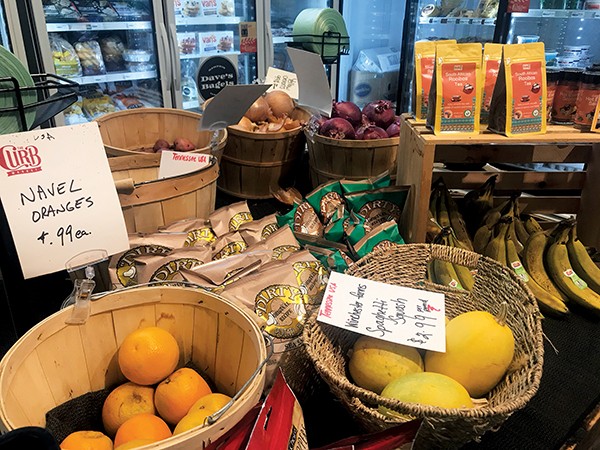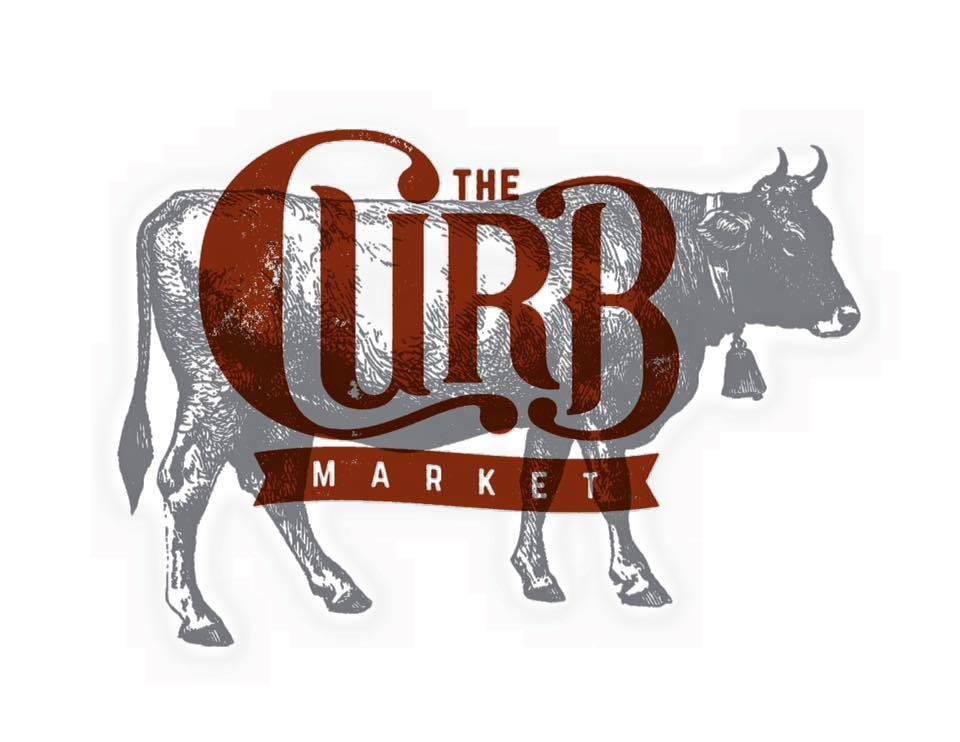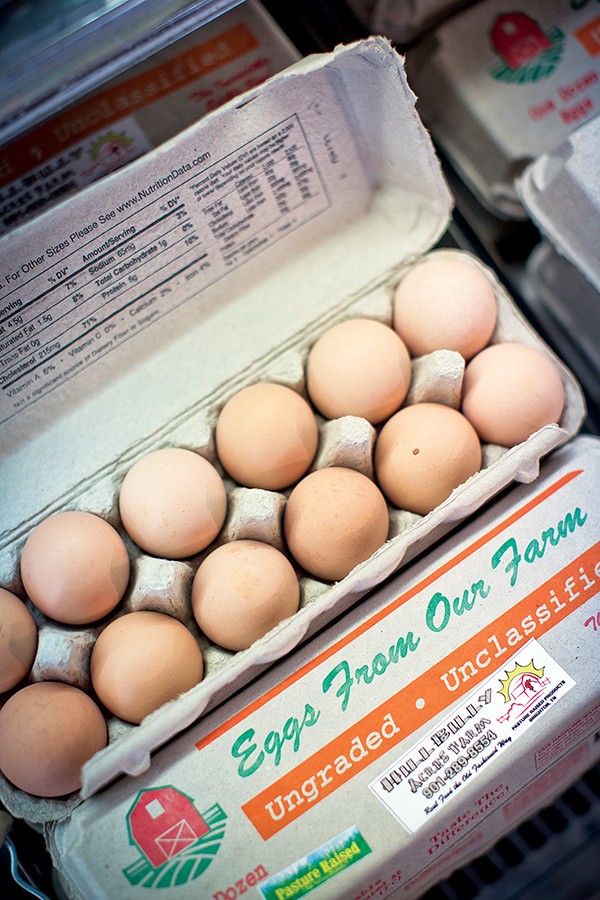Saturday will be a crazy Memphis moment. At least, that’s how Todd Richardson sees it.
Richardson is a co-founder of Crosstown Arts, the group that spurred the redevelopment of the massive, empty Sears Crosstown building.
Since 2010, Richardson’s mind has been focused on recruiting partners, signing tenants, finding funding, construction schedules, paperwork, designs, plans, and meetings, meetings, meetings. But at its core, Richardson still calls Crosstown a “miracle.”
“Yeah, at the end of the day, what a crazy Memphis moment?” Richardson says with a laugh. “It was the middle of the recession, and it couldn’t be done. It’s a completely unique redevelopment; there’s not another one like these in the country. So, we’re really celebrating the tenacity of the city for this miracle to happen. To me, that’s what August 19th is all about.”
Saturday is the Crosstown Concourse Opening Celebration, a moment eight years (or, nearly 90) in the making. The celebration starts at 3 p.m. with a dedication ceremony in the Central Atrium. The day continues with tenant open houses, live music, and a screening of a feature-length documentary about the Crosstown project.
Much of the building is already alive with residential and commercial tenants. But loose ends will be tied up as the year goes on — more apartments will be filled, programs will be started, and office workers will soon move into now-empty floors.
At full tilt, nearly 3,000 people will come and go there each day, according to Crosstown officials. That impact (economic and otherwise) will hit the area like an “atom bomb,” at least, in the words of a city official years ago. That energy will flow from a long-neglected “big empty” and revitalize a neighborhood that’s already feeling positive effects, with the potential for transforming a whole section of the city.
The (Way) Backstory
Company men from Sears, Roebuck & Co. quietly arrived in Memphis in the late 1920s, seeking sites for a retail center and catalog order plant. They knew if local property owners thought Sears was interested in their property, their prices would skyrocket. So, the Sears officials drove around town, pointing to sites from their car windows, while, behind them, real estate brokers followed in another car and took notes.
The company eventually settled on Crosstown, a then-suburban neighborhood about two miles from downtown. One hundred and eighty days after construction began, on August 27, 1927, Memphis Mayor Rowlett Paine cut the ribbon on a 640,000 square-foot facility that would employ more than 1,000 people.
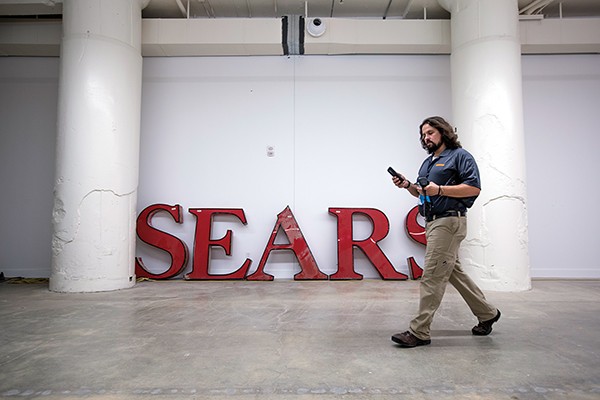
That first day, almost 30,000 shoppers came to visit the 53,000-square-foot retail center. At its peak, nearly 45,000 catalog orders left Sears Crosstown each day.
The building also had a small hospital, cafeteria, ladies recreation area, administrative offices, a credit union, board rooms, and “The Cypress Room,” for executive dining.
Forty years later, Crosstown had grown to a mammoth 1.5 million square feet on 19 acres. Unfortunately, like the original mammoth, it had become outdated. Shoppers had headed east and elsewhere. Sears closed the Crosstown retail store in 1983.
The site remained a regional distribution center for Sears. But less than 30 years later, due to the decline in the company’s mail-order business, Sears closed many of its warehouses across the country, including Crosstown. The building was left vacant in 1993 and remained an iconic emtpy tower for more than 20 years.
The (Recent) Backstory
Richardson can tell the story of Crosstown’s recent history in about a minute. He’s an art historian, a professor at the University of Memphis, but he knew the Crosstown property owner. Richardson asked about the building, and that started a “wouldn’t-it-be-cool conversation,” he says, which hasn’t stopped.
“The biggest challenge we had was to get people to see beyond what they see,” Richardson says. “This was a building the size of the Empire State Building that had been empty for 20 years in Memphis. It was in the middle of the recession, so, where do you start and could [anything] ever happen?”

Richardson and Christopher Miner formed Crosstown Arts in 2010 as a nonprofit arts organization that would serve as the building’s developer and would one day also be building tenant.
Two years later, the two had commitments from eight local tenants willing to lease a total of 600,000 square feet, nearly half of the building. By the time Crosstown officials asked the Memphis City Council for $15 million (the project’s final piece of funding) a year later, the building’s tenants included Church Health, Methodist Healthcare, Gestalt Community Schools, St. Jude Children’s Research Hospital, ALSAC, Memphis Teacher Residency, Rhodes College, and, of course, Crosstown Arts.
So, What Is It?
The Crosstown website now calls its facility a “vertical urban village,” and some variation of that term has been used to describe it from the beginning. The website also tries to invoke Crosstown’s spirit by calling it “a local heart for the cultivation of well-being, shifting focus from products to people, from commodity to quality of life,” adding that Crosstown will build “on three of Memphis’ strongest community assets — arts, education, and health care. Concourse is now a mixed-use vertical urban village with a purposeful collective of uses and partners.”
So, what’s in the village?
The building will include Crosstown Arts, Crosstown High School, and numerous health-care agencies. It’ll also be home to the Curb Market grocery store, numerous restaurants, a pharmacy, a nail shop, a FedEx Office store, apartments, and more. To anyone in commercial real estate, it looks like a classic mixed-use development, a mix of residential, commercial, and retail spaces. Many of the tenants, including Curb Market, FedEx, Farm Burger, Mama Gaia’s, and others, are already doing business in Crosstown.
But Richardson says it’s more than that and that it “can’t be managed like any other building in Memphis.” He said the building and the tenants who fill it have a deliberate tone, personality, and a spirit of inclusivity. They all “are intimately related, interconnected, and interdependent and, as a result, better because they are together.”
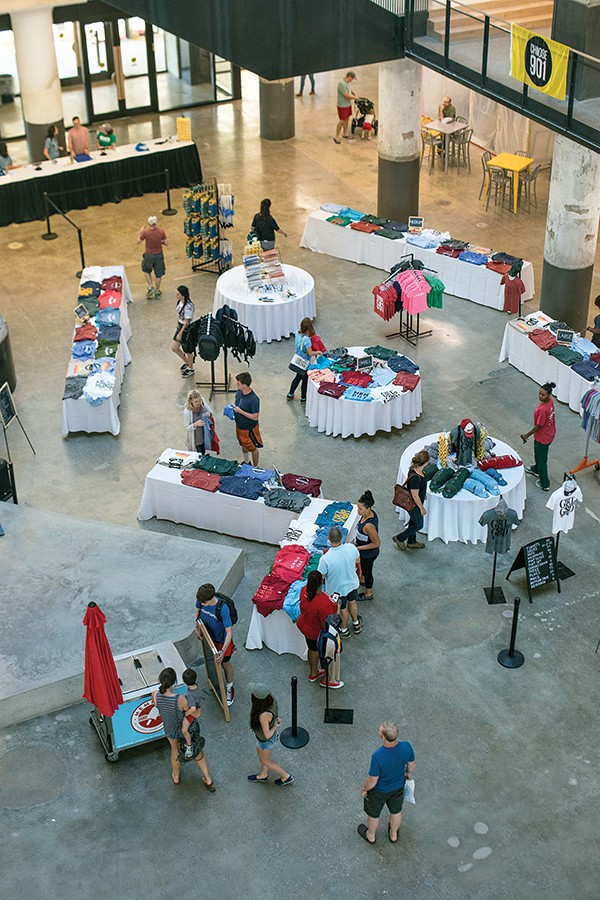
The building was designed for tenant interaction. Those tenants who have have chosen to locate in Crosstown did so because their individual missions will be lifted through those interactions, a Crosstown official says. All of the tenants, whether in arts, education, food, or health care, intersect at wellness, an idea that Ginger Spickler, Crosstown’s director of strategic partnerships and projects, said serves as an overall ethos for Crosstown Concourse.
“We’ve all been to office parks, where you’ve got lots of people in different buildings, none of whom interact with each other,” Spickler says on a recent tour. “So we knew even if we put people in this building, they would not necessarily interact unless we create spaces and experience for them to share together.”
So, Spickler says, the design of the building deliberately includes common spaces — a small open theater, large balconies, a massive central atrium — “where those unexpected connections and intersections can happen.”
That’s precisely why Gary Shorb, the new executive director of the Urban Child Institute, says he wanted to move his organization there, noting they’ll “be right next door to Pyramid Peak Foundation and the Poplar Foundation.”
“Geography always helps with collaboration,” Shorb says. “The closer you are, the better it will be.”
Crosstown Now
Bowties and sport coats mingled easily with hard hats and work boots during an early afternoon last month. The smells of electrical work pierced the aroma of roasting vegetables close to Curb Market. The mid-tempo thump of chilled-out EDM at Mama Gaia was often overcome by the scraping whine of power tools. It was easy to see how far the building had come — and that it still had a little way to go. Richardson says the building is mostly full: About 98 percent of the office space is leased. The apartments are around 80 percent occupied. Retail spaces were about 60 percent leased. The next step will be getting everyone moved in.

Curb Market
The celebration will be gratifying, Richardson says, but Crosstown Concourse’s true success won’t be realized Saturday.
“Success for us will be five or 10 years down the road,” he says, “when people are still here and enjoying it, and Crosstown is still the vibrant vertical village we all hoped and dreamed it would be.”
A Closer Look
Some of the tenants that will be based in Crosstown Concourse
Church Health
One of the founding tenants of Crosstown, Church Health spans 150,000 square feet over three floors in the building’s West Atrium. According to its mission, Church Health strives to provide affordable health care to Memphis’ working, uninsured population and their families. It’s served some 70,000 people since its inception in 1987.
But after the move to Crosstown, for the first time in those 30 years, all of Church Health’s services are in the same building. At its former location, 120,000 square feet of clinics, exam rooms, and offices were spread over 13 buildings on Peabody, Bellevue, and Union, says communications director for Church Health, Marvin Stockwell.
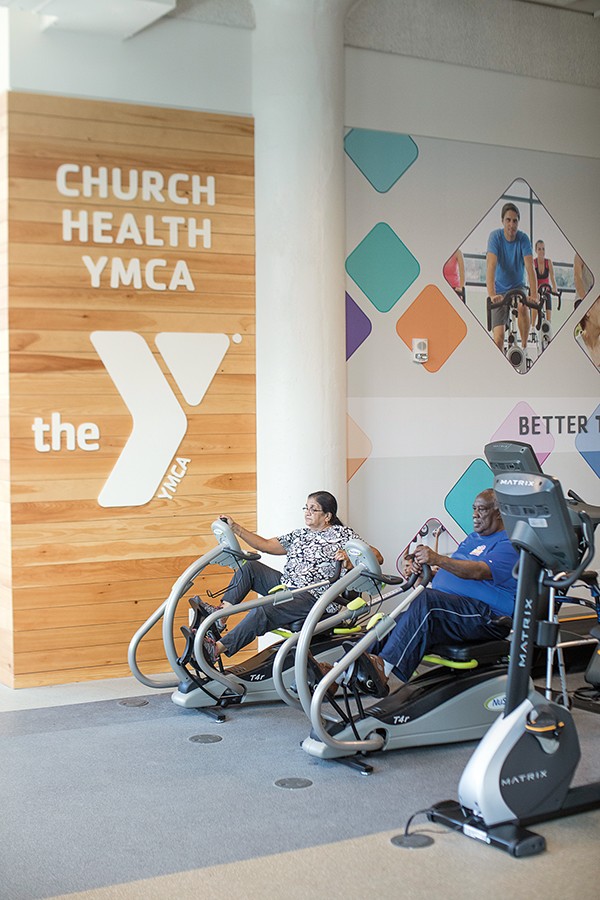
Church Health
The move to a space 30,000 square feet larger, yet still all under one roof, he says, will enable the center to “serve more people and serve them better.”
Stockwell says Church Health now has 62 medical rooms, compared to 34 in its previous locations. This increase, as well as more than twice the number of dental, eye, and counseling rooms, Stockwell says will vastly increase the amount of patients Church Health is able to treat.
In step with Crosstown’s “better together” vision of cross-organizational collaboration, Stockwell says the move has already paved the way for partnerships with other organizations, like the YMCA. Together they formed the Church Health YMCA for Church Health patients and others in the community to utilize.
He says when leadership from both organizations discussed their programming and missions, much of it overlapped, like fitness and “creative movement” classes, such as Zumba, yoga, and pilates. “The organization has grown because of partnerships now that we’re tucked into an urban village,” Stockwell says.
Church Health CEO Scott Morris says partnerships with more tenants such as Southern College of Optometry, Teach for America, Crosstown Arts, and others are also in the works. All of the partnerships, Morris says, will help Church Health be more effective at caring for its patients, adding, “We truly are better together for all of Memphis.”
Morris says the move has also made it possible for expansions into “new, vibrant areas such as culinary medicine — or food as medicine,” which he says will enrich Church Health’s overall work.
Church Health’s new teaching kitchen, located on the first floor, is more than twice the size of the former kitchen, says Stockwell. A larger, new, modern kitchen allows Church Health to offer coursework for a culinary medicine certificate from Tulane University, as well as community nutrition and cooking classes on how to prepare healthy food.
A notable part of the new kitchen is the commercial section, where Stockwell says Church Health is ramping up its own bread line, Whole Heart Bread.
He says after speaking with some local restaurant owners around the city, Church Health staff realized there was a need for locally-sourced bread in Memphis.
Stockwell says the bread line will be a way for the kitchen to do mission-type work while bringing in revenue to fund Church Health’s efforts to serve the community.
Another goal for the kitchen is to eventually partner with Memphis Tilth, which plans to hire someone to manage the kitchen full-time, and work with local food entrepreneurs who need access to commercial equipment.
Other spaces of Church Health’s operation include a chapel, community meeting room, child-care center, and “control room,” which will eventually be a broadcast workspace, producing health- and faith-related podcasts, Stockwell says.
The Parcels at Concourse
Creating something new from something old — that’s how Laura Anna Hatchett, senior community manager for LEDIC, describes the process of the realty company’s newest project: The Parcels at Concourse.
The Parcels are comprised of 265 apartments on floors seven through 10 at Crosstown. The unique interior of the building and the infrastructure of those top floors — once a Sears warehouse — shaped how the Parcels were designed, says Hatchett.
In order to fit 265 units on the top four floors of the building, 38 unit layouts were created, which are available in studio and one-, two-, and three-bedroom apartments.
Hatchett says the renovation focused on “maintaining the integrity of what the building used to be” by keeping the historical elements intact, such as the exposed brick walls and wood floors.

The Parcels
“Better together,” the idea behind Crosstown, inspired the various gathering spaces and community seating areas throughout the Parcels, including the leasing office itself, which protrudes from the seventh floor of the central atrium and will serve as a “living room” for residents, Hatchett says.
Another design element meant to foster community building, she says, are the indoor front porches that several of the units have and that residents are able to personalize.
“It’s a true live, work, play environment,” Hatchett says. “Residents can participate in numerous activities that are only an elevator ride away.”
The apartments — between 1,000 and 1,100 square feet per unit, run about $1.40 a square foot per month. Hatchett says an affordable housing grant allows 20 percent of the units to be rented at affordable market rate.
Of the 265 units, about 103 will house Memphis Teacher Residency residents, families of St. Jude patients, along with scientists working at the hospital, Church Health Scholars, Crosstown Arts residents, and Iris Orchestra Artist fellows. Residents began moving into the units in January and, as of press time, the Parcels were 82 percent occupied.
Madison Pharmacy
Though Madison Pharmacy’s old location is less than two miles down the road from its new home at Crosstown, owner Rende Bechtel says, and the biggest challenge in relocating is the logistics of moving and setting up the new space.
“It’s very scary,” Bechtel says, “But it’s a risk that could lead to a lot of opportunities.”
The privately owned pharmacy has stood on Madison near Auburndale for about 13 years, and Bechtel says they were happy there. But when she heard that Crosstown was looking for a resident pharmacy, it was an opportunity she couldn’t pass up.
“It was like fate,” she says, explaining that her parents both worked in the old Sears Tower and that that was where they first met.
Bechtel, who’s owned the pharmacy since 2012, says they have about 300 regular customers now and after the move are hoping to expand by taking advantage of the other health-care services housed in Crosstown, perhaps partnering with Church Health to serve some of its patients.
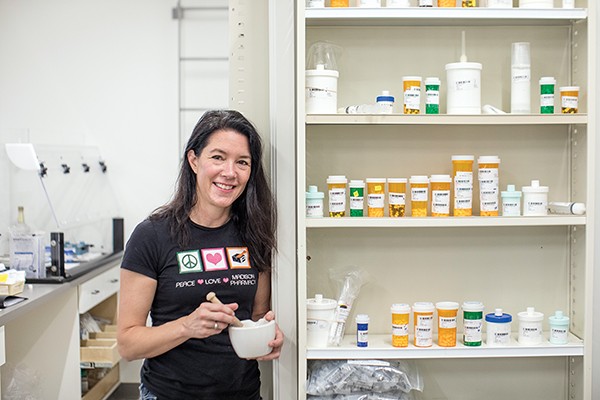
Madison Pharmacy
“Once we get there, I’m sure we’ll be right at home,” Bechtel says.
The new pharmacy will not only be larger than the old one, it will also become a convenience store, offering an expanded dollar section, essential oils, dog food, household products, makeup, and “a little bit of everything you might need.”
The hope, Bechtel says, is that “people who live and work here will come in on a regular basis and we’ll get to know them, while providing them with what they need.”
Area 51 Ice Cream
Area 51 Ice Cream, a family-owned ice cream shop out of Hernando, Mississippi, will make Crosstown its second location.
Karin Cubbage, who owns Area 51 Ice Cream with her husband, says they have been looking for a second location in Memphis for a while now, but no location seemed just right — until they saw the Crosstown space. She says they knew immediately that Crosstown was a good fit for the company and it was a project they wanted to be a part of.
Area 51 has been serving homemade ice cream along with fresh-baked goods at its location in Hernando for about three years. Cubbage says their foods are made with no artificial flavors — only fresh, locally-sourced ingredients.
“We try to do as much by hand as we can,” Cubbage says. “We even hand-make the chocolate chips that go into our mint chip ice cream.” Cubbage says she and her husband have good relationships with local farmers, like those at Cedar Health Farms, where they often buy seasonal berries.
Like its mother shop, the new location at Crosstown, will offer 12 ice cream flavors, as well as a specialty cookie and brownie each day. Since the new space is significantly smaller than the shop in Hernando, Cubbage says the ice cream will be made daily in Mississippi and transported to Crosstown.
After wrapping up the finishing touches on the new shop, including installing sidewalk-style cafe tables, Cubbage says the Crosstown location will open in late August. “We’re excited about exposing our product to another part of town that we haven’t been able to reach yet … and to be a part of the larger project in general.”
Crosstown High School
Around this time next year, 125 ninth-graders will walk through the doors of Crosstown as the inaugural class of Crosstown High School.
Ultimately, it’s expected that 500 students will comprise the student body at the public charter school. Those students, who will be chosen through a lottery, will be part of a learning experience that’s never been tried in Memphis. Instead of a teacher lecturing in front of a class, students will learn with hands-on projects based on student interest or on challenges issued by other tenants inside the Concourse.
Church Health, for example, may ask the students to help them design a wellness campaign for senior citizens in the Klondike neighborhood, says Spickler. “The students might then accomplish some of their math or English standards through creating different signage or something else by actually solving a community-based challenge.”
Students’ interests, talents, and learning pace will be taken into consideration at Crosstown High, and each student will have a personal learning plan.
Spickler says the school plans to have a diverse student body by reaching out to the community to recruit students to the school’s entrance lottery in hopes of making a school “that looks like Memphis.”
All of this will be fueled with a $2.5 million grant from XQ: The Super School Project, an initiative that challenged education officials to rethink the high school model.
For Crosstown’s model, school personnel talked with students, parents, teachers, and employers. Much of the school’s model is based on the design challenge, which Crosstown High began in November 2015.

 Anna Turman
Anna Turman  Anna Turman
Anna Turman  Photographs by Lorna Field
Photographs by Lorna Field 